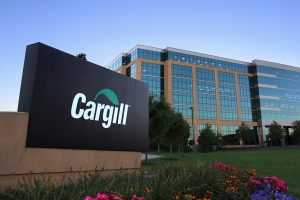


(Posted on 17/06/19)
Cargill has released a collection of sustainability reports across four key businesses: Aqua Nutrition; Cocoa and Chocolate; Ocean Transportation; and Premix and Nutrition.
The 2018 reports reflect Cargill’s comprehensive approach to sustainability, with a focus on creating connections across industry, government and communities that foster meaningful change and workable solutions to the world’s biggest sustainability challenges.
The reports provide insight into how Cargill addresses the impacts of climate change and delivers sustainable solutions that are transparent, innovative and collaborative. In addition, they highlight progress made on specific goals in key areas such as direct sourcing, improving traceability, building up the socioeconomic resilience of farmers and protecting ocean and aquatic life.
“Our work in sustainability focuses on reducing the environmental and social impact throughout our global operations,” said Ruth Kimmelshue, chief sustainability officer for Cargill. “Customers and consumers are looking to agriculture and industry to be part of the solution, protecting both people and the planet. These reports showcase critical efforts on that journey—efforts that increase efficiency in our supply chains, reduce resource use, lessen our carbon footprint and develop products to help our customers do the same.”
Cargill is committed to improving the sustainability of its operations and leading the maritime industry to a more sustainable future. In 2018, the business made important progress toward carbon emissions reduction targets, chartering more energy efficient vessels and preparing for sulphur emissions changes.
Cargill Aqua Nutrition supports the sustainable growth of the global aquaculture industry and its transformation towards more sustainable seafood production..
Cargill is committed to leading the industry towards a thriving cocoa sector, by increasing supply chain traceability, empowering cocoa farmer and tackling pressing issues using the power of technology. The company’s aim is to improve the lives of cocoa farmers and their communities across the five countries where it sources cocoa – Brazil, Cameroon, Côte d’Ivoire, Ghana, Indonesia.
Cargill works collaboratively with partners, farmers and customers to build a socially responsible, environmentally sound and economically viable animal nutrition supply chain. The company’s premix and nutrition division launched critical efforts to improve feed efficiency, reduce emissions and increase transparency.
ADM and Mitsubishi Corporation have signed a non-binding memorandum of understanding to form a strategic... Read more
ESL Shipping and global steel manufacturer SSAB have agreed on a multi-year extension of the agreement... Read more
Anglo American’s Sakatti copper and polymetallic project in Finland has been designated as a &... Read more
FEFAC, representing the EU compound feed and premix manufacturers, noted with deep concern the announced... Read more
Catering to the growing demand from India’s confectionery, infant formula, and dairy sectors,... Read more
Khalifa Economic Zones Abu Dhabi – KEZAD Group, the largest operator of integrated and purpose... Read more
Rio Tinto will invest $1.8 billion1 to develop the Brockman Syncline 1 mine project (BS1), extending... Read more
Catherine Cobden, President and CEO of the Canadian Steel Producers Association (CSPA), has released... Read more
Enough domestic ferrous scrap is available for electric arc furnace (EAF) steelmakers to supply nearly... Read more
Cargill’s Ocean Transportation business and leading tanker shipping company, Hafnia, have joined... Read more